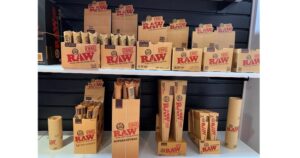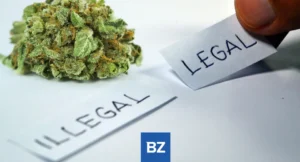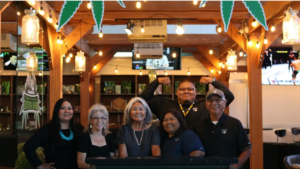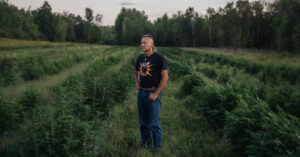From motifri.com link to article by Waylon Don Pretends Eagle, Nov 13th 2019
My cannabis journey began in the 1980s, and I always knew there was more that Indigenous people could teach others about plant medicines.
In 2018, former Fall River mayoral candidate Erica Scott (Lenape tribe) and I were fortunate enough to cross paths when we embarked upon an adventure in the industry. Because she’s a clean water advocate and protector in her community, I strongly suggested that Scott pay a visit to what I consider to be my homelands, the Bakken Shale Formation (aka, North Dakota oil and gas fields), which she had never seen prior to my introduction.
The Fort Berthold Reservation in western North Dakota is a completely different landscape than that of Rhode Island and southern New England. That one reservation spreads across just under one million acres and is home to some 7,000 inhabitants. Not that it matters to the oil and gas giants who seem to think they know what’s best for legislators and citizens alike.
In the late 1970s, there was a boom-bust cycle incited by the oil industries, and to fill the void of that ’70s boom-bust, some families had to resort to what was considered a public service — providing high-quality cannabis to others in the community. I recall one day stumbling upon a large black trash bag, and inhaling a specific scent that to this very day gives me a feeling of happiness, joy and comfort.
After Scott and I joined forces, the memory of that scent flashed back into my head many years later during a chance encounter with a friend who gave me the opportunity to open a similar bag — although this one was a large white bag that needed a forklift to move. At that moment, I realized that I had been around this industry and the advocates who couldn’t possibly voice their support in the 1980s for nearly my entire life.
That peppery, earthy, loamy aroma wafting out of that white bag made me flash back to Mandaree, ND, but it also kept me in Rhode Island and Massachusetts. From Narragansett territory to Mandan-Hidatsa territory and all the way out to the land of the Pomo, Indigenous growers like Dewey Cisneros and Dustin Finley have embarked on the tribal hemp and cannabis industry. But they’re involved in a game of patience; Cisneros, Finley and many others are waiting for their tribal governments to pass the right resolutions and ordinances that would decide the fate of their 2019 growing season. And that is because the United States Department of Agriculture hemp regulations were not promulgated in time for any tribes to make any decisions except for the Oglala Lakota Nation — more famously known as the Pine Ridge Indian Reservation. There, one family — the White Plumes — and one individual — Nick Hernandez — had successful crops on their homelands. Over in Lumbee country, it was the one and only Nick Hammond who successfully harvested nearly 5,000 plants from his spring crop. He and his business partners at Good Earth Hemp Company hope to grow on their own land in 2020 and beyond.
Back in Rhode Island, so few tribes have been in a position like the Narragansett where they can take liberty with their treaty rights to create new opportunities for their people. Some tribes outside of the area have found it difficult to get the right legal direction or guidance until federal laws change.
Not very many people who grew up on the reservation ever get the chance to leave and explore the opportunities we are all afforded here in this country. Some of us get isolated in that community and we feel like we can never ever get out or away. Sometimes it can lead to a seemingly impossible situation and some develop defiant attitudes toward all people. Then we get called lazy or dirty and unreachable or worse yet, unteachable. But the truth is we are empowered, we are able and we are making change. Change doesn’t require permission, nor does it need to be instigated from outside. Indigenous communities have the chance to define a new and booming market.



















Comments are closed.